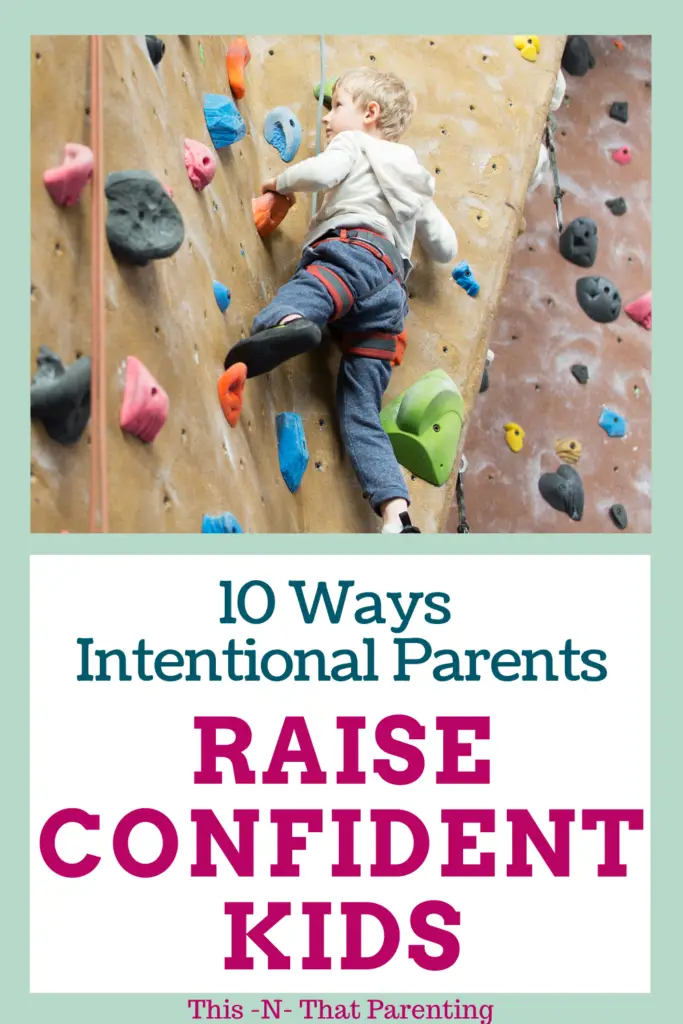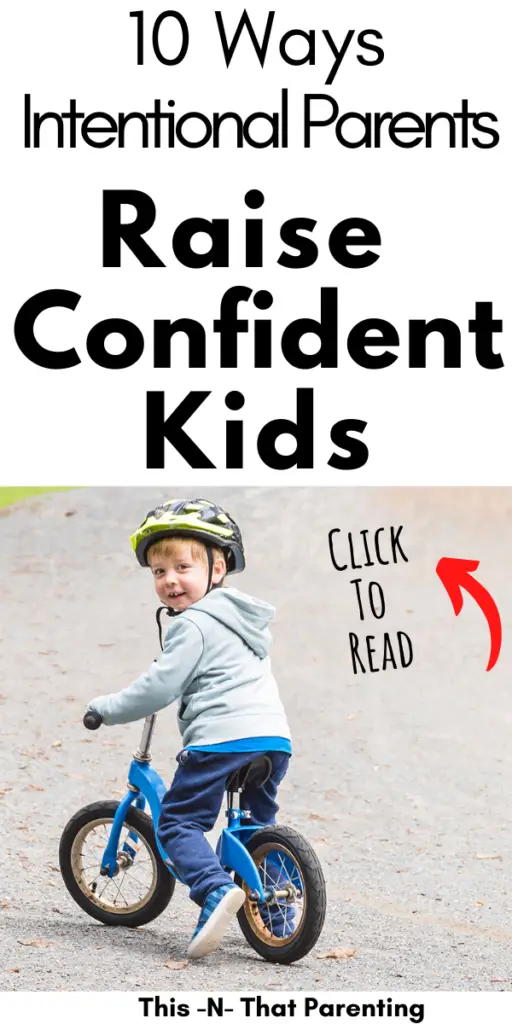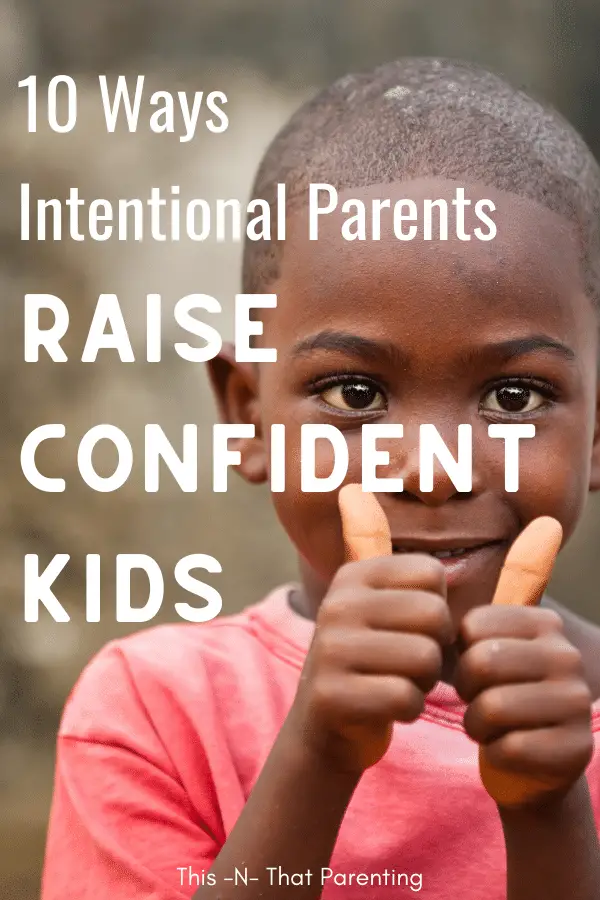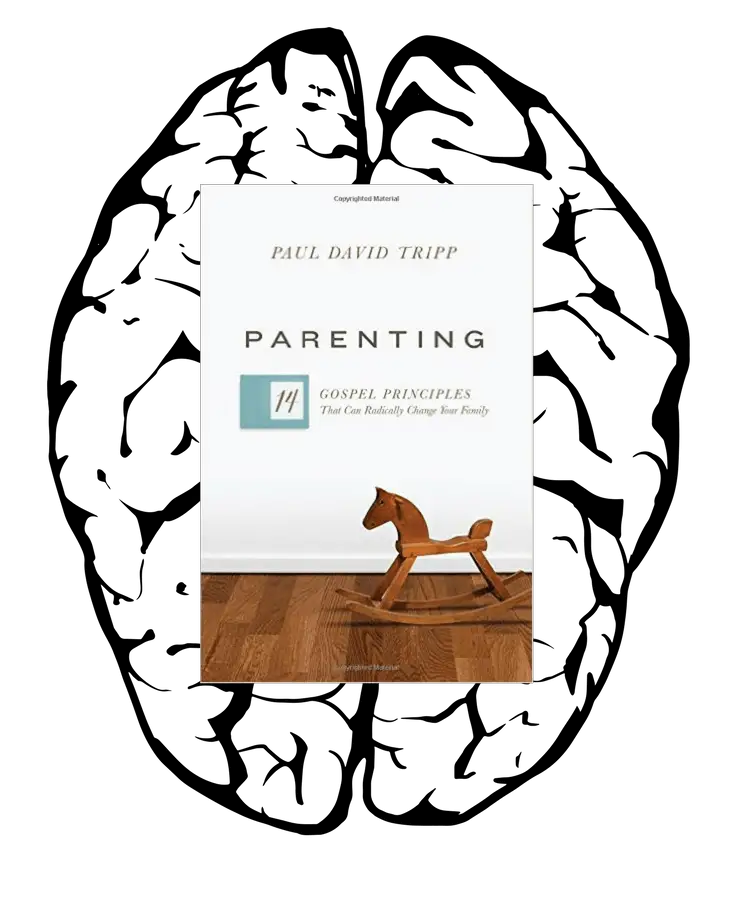10 Ways Intentional Parents Raise Confident Kids
Have you ever wondered why some kids will try anything or speak to anyone and the next child hides behind their parent’s leg? Well, part of it is temperament and personality, but the other part is how they are raised. Yes, there are habits you can practice to be intentional about raising confident kids. The effort is worth it.
I will show you how to be intentional about raising confident kids. Throughout this article, take notice that I share language or script that builds confident kids. Parents of confident kids speak to their kids with intentional language. Use this language with your child and be intentional about the habits I provide, and you will be well on your way to raising confident kids.
What Are Confident Kids?
Confident kids are children who try things and don’t let their fears get in the way. When a child has confidence, it shows in the way they carry themselves. Not in arrogance, but in posture, eye contact, body language, and the way they dress.
A confident child knows their value and worth and trusts and believes in their own capabilities. Do these sound like character traits you’d like to pass on to your child?
It is important to note that depending on what your child is doing, their confidence can fluctuate. It’s only normal for them to have more confidence in things they have tried before or things that come more naturally to them. They may not have as much confidence in something they’re trying for the first time or when facing a fear. Your job is to support them and coach them through it.
What Benefits Do Confident Kids Have?
- Confident kids develop stronger relationships.
- Most confident kids have a very positive mental attitude.
- Confident kids are usually healthier.
- Many confident kids are more relaxed in social settings and don’t mind meeting new people.
- Confident kids tend to do better in school and in their extracurriculars than their peers.
- The better a child’s confidence and self-esteem, the better chance they have of standing up to peer pressure.
10 Habits Intentional Parents Use To Raise Confident Kids
1. Make sure your child feels cherished and loved.
Children thrive when they feel cherished and loved. Of course, you love your child, but the key here is that they must feel it! Unconditional love should be something parents are trying to accomplish. Love with no strings attached. Love with no expectation of someone doing something in return or behaving in a certain way. When a child’s love tank is full, they can focus on achieving greater things.
Pay attention to your child, spend one-on-one time with them, and make them feel delighted in for who they are and who they want to be. If you want to raise confident kids, they must feel loved.
2. Keep your child on a daily routine or schedule.
Children thrive on routine. A normal routine brings comfort, consistency, and stability to a child’s life. Though adults may find repetition boring, children flourish from repetition.
A daily routine or schedule makes a child feel empowered because they know what to expect. They take control of their daily lives, form habits, and know what you expect of them. This helps a child to feel confident.
Related Article: How To Create A Routine That Works For Your Family
3. Teach your child Bible verses and affirmations.
Talk to your child about negative self-talk. Tell your child everyone has it. Children are capable of becoming self-aware and conscious of how they talk to themselves.
No matter what hero or person your child admires, that person deals with imposture syndrome and has learned a way of quieting the inner critic. Discuss this with your child and coach them through positive self-talk when they are struggling or learning new things.
Give children Bible verses and affirmations to rely on to combat the negative self-talk. These equip your child, and they can use them for a lifetime.
Some great examples for kids:
- Phillipians 4:13: I can do all things through Christ who strengthens mesit.
- Hebrew 13:6: The Lord is my helper. I will not be afraid.
- Psalm 28:7: The Lord is my strength and my shield. My heart trusts in him and he helps me.
- It’s not what happens to me but how I respond that matters.
- Everything is figureoutable.
- I am enough.
- I am brave.
- Winners never quit. Quitters never win.
- I am good at making decisions.
- It’s OK to make mistakes. I can learn from my mistakes.
4. Teach your child that all emotions are OK. It’s how we handle our emotions that matters.
In Raising An Emotionally Intelligent Child, Dr. John Gottman gives parents powerful tips for raising a self-aware child. The more a child is self-aware and in control of their emotions, the more confident the child.
Emotional awareness means that you recognize when you feel an emotion, identify your feelings, and be sensitive to other people’s emotions.
Do not dismiss your child’s feelings such as, “You’re Ok. That didn’t hurt. Don’t cry. That’s nothing to be afraid of. You’re just fine.” But be there for your child and allow them to feel their feelings.
Listen empathetically and validate your child’s feelings. You don’t have to agree with them. You just have to be there for them and support them. Don’t try to fix things. They need to feel understood and know that your there for them.
Help your child label their emotions. Children do not have the language to label their emotions. They need you to help them, and when you do, they feel understood and empowered.
Example: Your daughter gets a medal at the end of her soccer game. Your preschooler is crying because he doesn’t have a medal. You can say, “You’re sad, aren’t you? You wish you had a medal. I bet that even makes you feel a bit jealous.” Now the child feels understood, they have words to describe what’s going on with them, and they have a coping strategy.
5. Foster a growth mindset in your child.
According to Dr. Carol Dweck, author of Mindset, humans are born with a fixed mindset or a growth mindset. Having a fixed mindset means that you believe your abilities can’t change. You are who you are. People with growth mindsets understand that their abilities can improve. You are always learning and developing.
As parents, be intentional about supporting your child in a growth mindset. A major way to do this is with the language that you use with yourself and your child.
How To Talk To Your Child To Support A Growth Mindset
- Add the word yet… I can’t ride my bike without training wheels, yet.
- Praise the process, not the product: I noticed how many times you tried before you could go without training wheels.
- I believe I can get better.
- I need to figure out how they did that.
- This isn’t working. I need to try something else.
- Instead of this it is too hard: This will take a lot of effort.
- Practice makes progress.
To be a parent who supports the growth mindset, you don’t want to get upset when your child makes a mistake. Milk spills, a child who doesn’t run after they hit the ball, messy handwriting, talking too much, dresses funky. Your child will do something cringe-worthy in your eyes. The key is to support and love them through it. If not, you can create a child who is too timid to try.
Encourage your child to face their fears and try new things. It’s Ok to fail. Now, you can’t expect them to be confident kids when they’re brand new at something. But with your support, teaching, and encouragement, they will become more confident kids. Even if they don’t become a pro at whatever they try, they build more confidence in trying than if they hadn’t given it a go.
I learned from Dweck that we can have a fixed mindset in certain areas and a growth mindset in other areas. For example, some people have a fixed mindset about academics but a growth mindset about hobbies. You will have to pay attention to your child’s mindset to decide where they are on the spectrum.
6. Make sure they know their strengths, and they are willing to work on their weaknesses.
Be on the lookout for your child’s interests. When they show interest in something, support them in diving deeper into the topic. Sign them up for the sport or lessons. Check out books from the library about the topic. Look up the topic on Amazon Prime or YouTube. Immerse the child in their interest. Help them find their passion.
You set them up for success when you follow their interests and passions. The less you put your ideas of who they should be and follow who they are the better chance your child will be successful and confident.
Children with a growth mindset understand that they are not good at everything. They have weaknesses, and they have to work and practice to strengthen those weaknesses. The more of a fixed mindset a child has, the harder this concept will be for them. This will be an area you will just have to be intentional about supporting the child. Remind them, “You weren’t born walking. You had to learn. Look at you now!”
Kids with confidence and high self-esteem are resilient enough to keep trying, even when they don’t succeed at first.
7. Let your child make some of their own choices.
- Don’t give too many choices. Because of brain development, too many choices can just lead to overwhelm. Usually, 2 is enough.
- You should be fine with whatever the child chooses. If not, this is probably a loaded choice, which is manipulation, not a choice. Example: Would you rather do your homework now or stay home tomorrow from the pool and do it? Just say, if you don’t do your homework now, you will do it during your pool time tomorrow. This isn’t a time for choice.
- If the child doesn’t make a timely choice, make the choice for them. Let the child know. If you don’t choose, I’ll be choosing for you.
- Be consistent. If you give dinner choices 3 times and then quit, that’s hard for a child to understand. Keep the line of trust open. You can say, “I’m not able to give you a choice on your veggies tonight. We only have green beans. When I go grocery shopping, we will have more choices.”
Related Article: If you need ideas on ways to give your child choices, read 10 Smart Ways To Give Your Child Choices And The Benefits

8. Let your child take risks and do things on their own.
Allow your child to take risks. Do you say, “Be careful!”, often to your children? Turns out, those words don’t mean much to a child. They need you to be more specific about what they need to be careful about.
God created children with a desire to experience risky play. They love the fear and excitement of it. It is exhilarating for them to experience climbing higher, playing with dangerous tools and near dangerous terrains, moving at high speeds, rough and tumble play, and playing in areas where there is a risk of getting lost. (source). If a parent is constantly stopping them from partaking in risky play, it takes a toll on their confidence.
It’s our job to find harmony in safety and risky play without throwing water on the fire.
Here are some great phrases to use when you want to say, “Be careful!”
Ann Landers said, “It is not what you do for your children but what you teach them to do for themselves that will make them successful human beings. Along those same lines, Maria Montessori suggested, “Never do for a child what they can do for themselves.”
This can be a challenge depending on your parenting style but allow your child to give it their best go before you jump in and take over on task. Once they’ve done something such as dress themselves or clean up their room, don’t come in and redo their efforts or lecture how it could have been better. This sends a message you do it better or their efforts aren’t good enough. This is the #1 reason children stop trying.

9. Have your child help with age-appropriate chores around the house.
Even though many children complain about having to do chores, this one is worth pushing through and putting a plan into action. According to a Harvard Study, children with a good work ethic is an indicator of success as adults.
Goal: Teach your child to have an “I need to pitch in around here” attitude and teach them to be on a constant lookout for ways they can help. Eventually, it will come naturally.
Children who help around their homes have a sense of pride and value knowing they pitch in and keep things running smoothly. This gives them confidence in their abilities and sets them up to adult successfully.
If you’re not sure what chores are appropriate for your child, go to Pinterest and search Age Appropriate Chore Charts. You will get plenty of ideas about what your child can help you out with.
10. Practice self-confidence in yourself.
It’s always important to model being the adult you want your child to be. Confidence is hard to fake, but you can do the above suggestions. They are for anyone. Not just kids.
I encourage you to make it a goal to try new things, face your fears, and use Bible verses and affirmations. Discuss your strengths with your child and talk about how you’re trying to work on a weakness. Set goals and ask your child to be your accountability partner if they’re of age to be.
You are your child’s first hero, and nothing motivates a child more than trying to be like their parents.
Bonus Tip For Raising Confident Kids: Teach Your Child Manners
Last but definitely not least, I want to give you a tip that society is often overlooking this day and age. Research shows that children who use manners are:
- Treated with more respect and dignity
- Given more opportunity, especially for leadership positions
- Involved in better, successful, healthier relationships compared to their peers who do not use manners
- More confident than peers who are mannerless
Teaching your child manners sets them up for success. It is worth parents’ time and effort to give their children this advantage.
I wrote an article about manners and created a printable Teach Your Child Manners Kit. I encourage you to read the article and put it into practice.
Related Article: Everything Parents Need To Know About Teaching Kids Manners
10 Ways Intentional Parents Raise Confident Kids Bottom Line
As you can see, there is a lot of action parents can take to raise confident kids. If you are intentional, you will help your child to be more confident. These habits will carry with them into adulthood. Intentionality with self-confidence can change your family’s legacy.
Education Resources For You
- 10 Ways Intentional Parents Raise Confident Kids
- How To Send An Effective Email To Your Child’s Teacher: The Dos and Don’ts
- Lighting: How It Affects Your Child Physically, Mentally, and Academically
- 7 Shocking Facts About The Development Of Your Child’s Prefrontal Cortex
- Advocating for Your Child At School – Stay Involved!
- 10 Brilliant Tips To Help Your Child Thrive During Virtual Learning
- A List Of Parenting Resources: The Best Of The Best
- Peaceful Parent Happy Kids by Dr. Laura Markham: A Book Review
- Time To Parent by Julie Morgenstern: A Book Review
- 200 FREE Kid-Friendly Alexa Commands For Your Echo Device


Make it a great day or not, the choice is yours! Remember to have fun, laugh and give God the glory! I love you! SS








